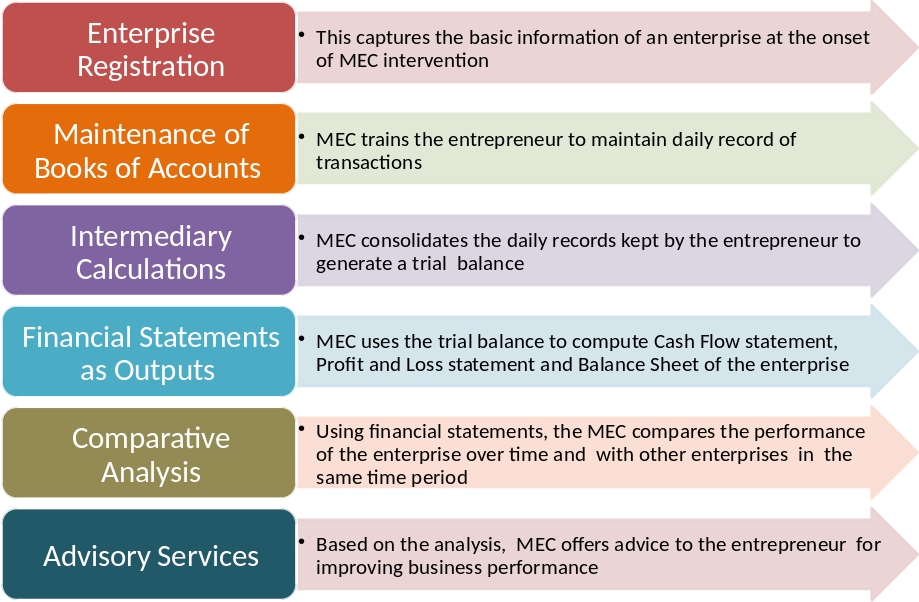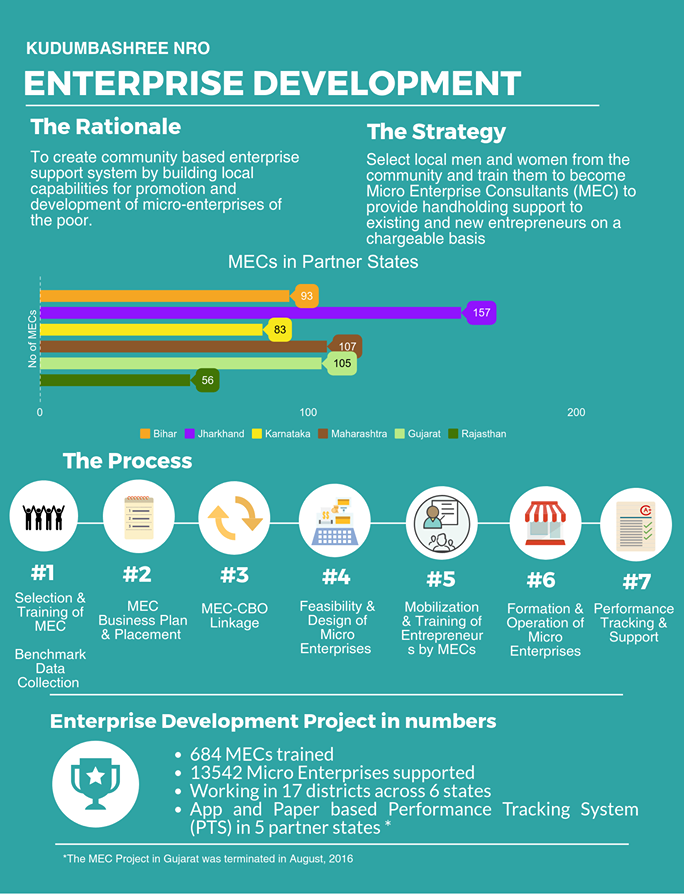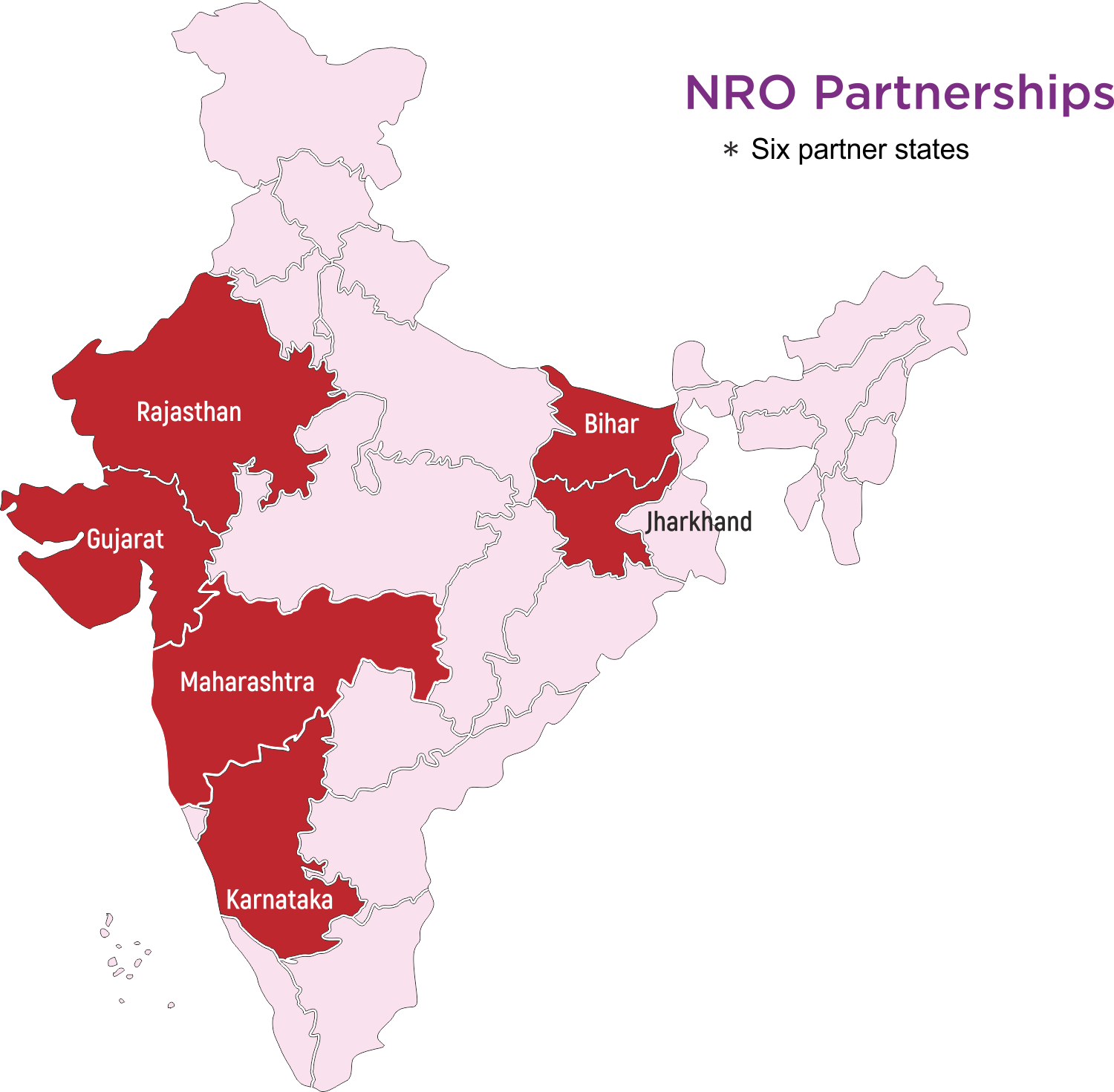States / Programmes / MEC Project

MEC Project (3)
Enterprise Benchmarking Surveys
- These surveys are meant for developing benchmark values for a set of identified parameters for tracking the performances of micro enterprises run by the poor. It has come out of the understanding of the need for separate performance standards for benchmarking of micro enterprises of the poor; conventional industry standards are not useful here.
- Data is collected from existing enterprises on their ownership, capital, operations, and costs. MECs collect data for each pilot district and feed into a software application which calculates values for given parameters.
Performance Tracking System
PTS is a method of systematic collection and analysis of business information, to understand and measure business performance. The system is administered through Micro Enterprise Consultants (MECs), who have the responsibility to ensure maintenance of basic books of accounts by the entrepreneur, collection of data from the enterprise regularly, and generating financial statements from the transaction data thus collected. The financial statements allow comparison of the performance of an enterprise over time, and that of different enterprises of the same type at a given point of time. The PTS is currently being administered on paper as well as in an app based system. It ensures regular monitoring of the micro enterprises set up by poor women.

Utility of PTS to Stakeholders
PTS helps the entrepreneur in understanding the performance of the enterprise, analysing it, and thereby improving performance. It also helps the entrepreneur in availing finances for the enterprise as it ensures systematic book keeping and timely generation of financial statements. It helps banks and financial institutions in assessing the performance of the enterprise and the credit-worthiness of the entrepreneur. For the State Rural Livelihood Missions (SRLMs), the PTS provides useful information on the performance of enterprises covered under their projects, in monitoring the performance of MECs, and in formulating or changing policies on enterprise promotion.
MEC groups and business plans
- The objectives of MEC group formation includes pooling of multiple skills so that they can support a range of businesses and also ensuring uniform and remunerative territories for MEC groups to operate.
- The steps include assessment and ranking of blocks based on pre-set parameters, grouping of blocks into ‘zones’, and formation of MEC groups for zones. At the end of the exercise, pilot district is divided into different zones and each zone has an MEC group.
- Each MEC group has to come up with a business plan; the business plan preparation has the following objectives.
- Assessing existing and potential business opportunities for MEC groups and estimating earning potential
- Assessing the capabilities of MEC groups and figuring out ways to utilise them
- Estimating capital requirement for MEC groups to start their business
- Engaging MECs in remunerative business activities as per the plan
- Finalising business plans for the groups
Training Programs offered to Micro Enterprise Consultants
As the project's primary focus is on creating a community based support by training local persons in business management skills, a great emphasis is laid on providing intensive training and developing the skill set of Micro Enterprise Consultants. This is done by providing them with a comprehensive taining program spanning over 45 days over a period of six months. The objective is to equip them with basic math, soft skills and business managements skills. The sessions are provided by experienced and trained personnel and is done through class room sessions, group work, process oriented activities and even home based assignments.
| Trainings offered | Description |
| GOT (General Orientation Training) | |
| Training in Entrepreneurship Development (TED) |
Overview
Objectives
Duration
Pedagogy
|
| Training in Enterprise Administration and Management (TEAM) | Overview
Objective
Pedagogy
|
Drawing from the experiences of developing micro enterprises in Kerala, KS-NRO works with partner-states to develop customized approaches suited to the local context. The strategy adopted for promoting micro enterprises in partner-states is distinctly different from that of Kerala as on one hand, the existing mechanisms in the district/block (of partner state) supporting micro enterprises may not be strong enough and on the other hand, entrepreneurs are relatively ill-equipped to face operational challenges and do not have adequate business knowledge. It is in this regard, the MEC project aims at developing field-level structures focused on providing multi-dimensional support to the rural microenterprises of the poor in partner states. The idea is to identify individuals from the community, train them and equip them to provide necessary handholding support to potential and existing rural enterprises.
MEC Project was drawn up with the following objectives
• Creation of sustainable livelihoods for rural people through self-employment initiatives
• Provision of community level handholding support through trained micro enterprise consultants (MECs)
• Enabling State Rural Livelihood Missions (SRLM) to formulate state policy for enterprise promotion and support
Project output
The project output is to identify, train and place Micro Enterprise Consultants (MECs) to provide hand-holding support to enterprises in a sustainable manner. The major activities under the project include identification and selection of MECs from the community, building their capacities and placing them in groups, establishing MEC-CBO linkages and rolling out sustainable monitoring mechanisms. It is about providing end-to-end support to potential entrepreneurs from the poorer sections of the society.
Implementation
Among the National Resource Organizations approved by National Rural Livelihood Mission under the Ministry of Rural Development, Kudumbashree NRO has done pioneering work in the area of promoting sustainable micro enterprises. When an interested state approaches Kudumbashree NRO, the first step for developing a partnership is to sign a MoU with the relevant state’s rural livelihood mission (SRLM). It is followed by exposure visits by officials from the SRLM to Kerala to understand the model as well as exploratory visit by a team from KS NRO to the partner-state to devise the scope and extent of the project. The next step is to place mentors in these states who will be responsible for driving the project on ground. The mentors are responsible for studying the existing enterprise scenario in the district/block and for establishing a mutually beneficial relationship with the community network and officials from the SRLM. Potential MECs will initially be identified by the SRLM. KS-NRO will be responsible for designing the selection process and conducting the selection-orientation workshop, at the end of which, a pool of MECs will be selected.
The next step is to train the selected MECs. Training programs like TED (Training in Entrepreneurship Development) & TEAM (Training in Enterprise Administration and Management) are provided through Master Trainers to equip them with basic arithmetic and business management skills. At the end of the trainings, MECs will be capable of formulating business plans for new enterprises and conducting business diagnostics for existing enterprises. It is with this acquired knowledge, the MECs offer their services to entrepreneurs in the MEC project district. Once the training is completed, the MECs are divided into groups and each group will be supporting a different zone in the district.
The MEC group will be responsible for benchmarking of enterprises in their area which includes collecting data on existing enterprises, grading them, and development of sectoral performance and business result indices. The MEC group will then engage with the community network to identify entrepreneurs and provide them with necessary support including forward and backward market linkages. They will also be responsible for encouraging women to start their own enterprises.
Micro Enterprise Consultants are the pillars of this project and shoulder the primary responsibility in supporting enterprises in the block. Their specific services to new and existing enterprises include identifying viable business opportunities appropriate to the conditions of the entrepreneur and the market, developing bankable business plans, linking them with financial institutions, helping entrepreneurs with sourcing of raw materials and facilitating market linkages. The MECs are also trained in maintaining web-based and app-based mechanisms which will be used for monitoring the financial performance of the businesses they support. The MECs will then use this information to guide the entrepreneurs in taking decisions which will be most beneficial for their business at frequent intervals. For the services provided by them, the MECs are paid as a group by the community network based on the MEC policy issued by the SRLM.

BACKGROUND
Micro-enterprises of the poor that are developed as part of poverty alleviation programmes often face serious operational challenges. Persistent hand-holding and capacity building support are needed to ensure these enterprises evolve into sustainable sources of livelihood for the poor. Based on this understanding, the Micro Enterprise Consultant (MEC) project focusses on developing field level structures which can provide multi-dimensional support to the rural micro enterprises of the poor.
As part of the MEC project, individuals are identified and trained from local communities to become Micro-enterprise Consultants. The MEC are responsible for providing hand-holding support to potential and existing rural entrepreneurs on a chargeable basis. The MECs are also encouraged to partner each other and form firms that leverage their diverse skill sets. These MEC firms offer a wide range of business consulting services to rural entrepreneurs. To provide rural entrepreneurs support services such as performance tracking of their enterprises and micro-enterprise accounting, the MEC project introduced an IT enabled real-time information system called Performance Tracking System (PTS) in its pilot locations. Since enterprises form a valuable part of the diverse pool of livelihoods that poor families depend on, the project envisages linking the Community Based Organisations (CBO) with MEC Firms to create mechanisms for the promotion of enterprise development among the poor in its pilot locations.
PROFILE
The MEC project has been implemented in six states across India including Bihar, Jharkhand, Karnataka, Maharashtra, Gujarat and Rajasthan on a pilot basis.
| PROJECT FOOTPRINT | |
| No. of partner states | 6 |
| No. of districts | 17 |
| No. of blocks | 180 |
| No. of gram panchayats | 6014 |
| No of MEC trained | 684 |
| No. of mentors | 14 |
